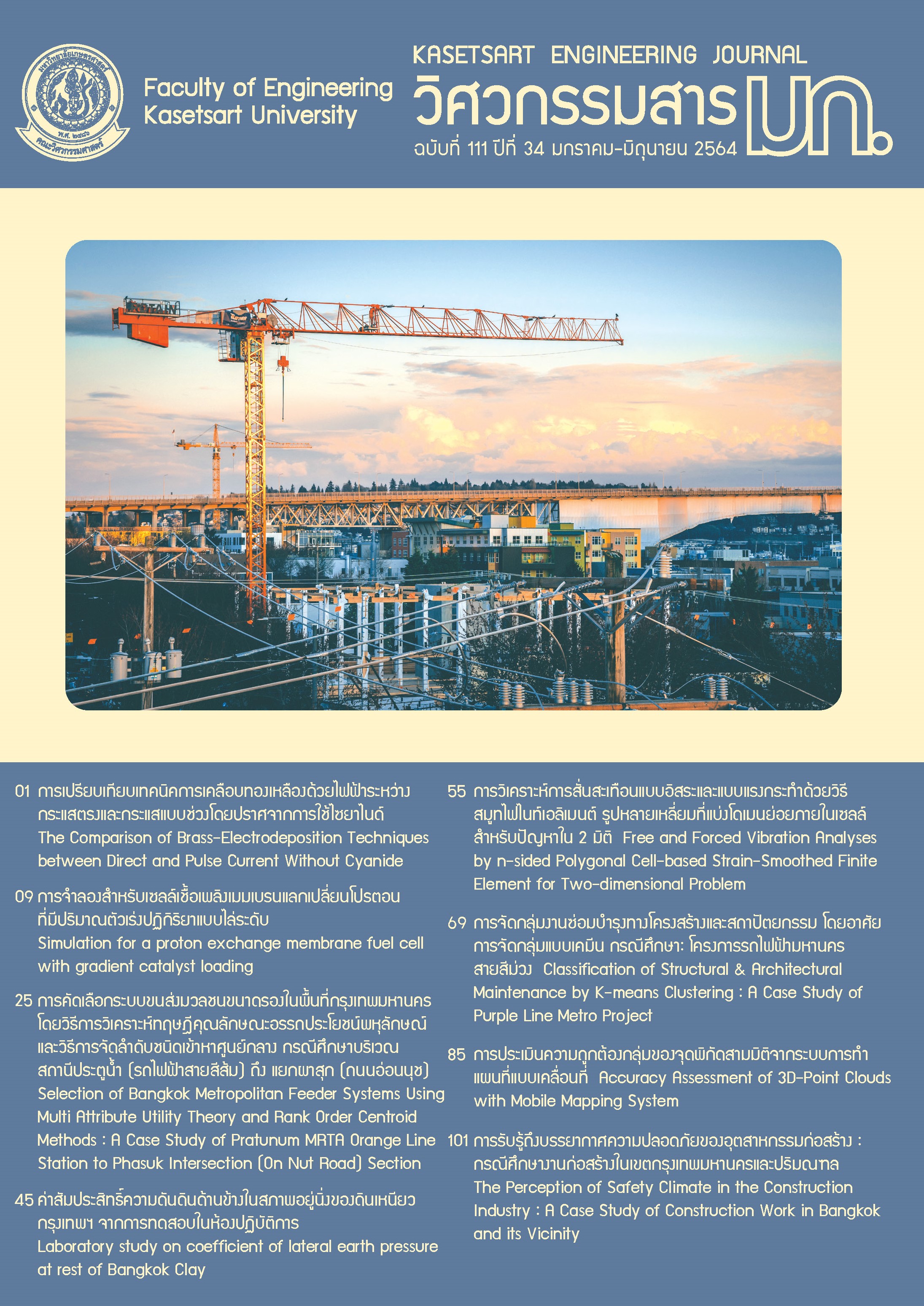Accuracy Assessment of 3D-Point Clouds with Mobile Mapping System
Keywords:
Mobile mapping system, 3D-point clouds, Accuracy assessmentAbstract
Mobile Mapping System (MMS) is well-known as a modern surveying technology that utilizes to acquire the environmental data of roads in the form of three-dimensional (3D). Previously, receiving the environmental data on the road was difficult and unsafe due to the traffic on the road. Surveying with MMS provides more capability, fast, time-saving, and precision. However, the component of MMS combines with numerous sensors and acquiring data while MMS is moving; the data may contaminate with errors due to several factors. Therefore, this research investigates the accuracy assessment of 3D-point clouds surveyed from MMS by verifying the positioning accuracy using the checking points (CPs) with global navigation satellite system (GNSS)-based positioning through the real-time kinematic (RTK) technique. The examined results of 3D-point clouds before adjusting by ground control points (GCPs) show that the RMSEr in horizontal is about 0.084 m, and the RMSE in vertical is about 0.123 m. The 3D-RMSE at a 95% confidence level is approximate 0.241 m and falls within Class 3 of NSSDA. And the examined results of 3D-point clouds after adjusting by GCPs indicate that the RMSEr in horizontal is about 0.076 m and the RMSE in vertical is about 0.046 m. At the same time, the 3D-RMSE at a 95% confidence level is only 0.089 m and falls within Class 2 of NSSDA. The 3D-point clouds have a significant amount of error in vertical, but after adjusting with GCPs, the obtained result shows that the error is significantly decreased.
References
Kukko A, A Jaakkola, M Lehtomaki, H Kaartinen, and Y Chen (2009). Mobile mapping system and computing methods for modelling of road environment. In 2009 Joint Urban Remote Sensing Event. of Conference.
Puente I, H González-Jorge, J Martínez-Sánchez, and P Arias (2013). Review of mobile mapping and surveying technologies. Measurement, 46(7): 2127-2145.
Ma L, Y Li, J Li, C Wang, R Wang, and M A Chapman (2018). Mobile Laser Scanned Point-Clouds for Road Object Detection and Extraction: A Review. Remote Sensing, 10(10).
Xiang B, J Yao, X Lu, L Li, R Xie, and J Li (2018). Segmentation-based classification for 3D point clouds in the road environment. International Journal of Remote Sensing, 39: 1-31.
Yang M, X Liu, K Jiang, J Xu, P Sheng, and D Yang (2019). Automatic Extraction of Structural and Non-Structural Road Edges from Mobile Laser Scanning Data. Sensors, 19(22).
McCormac J C, W Sarasua, and W Davis (2012) Surveying, 6th Edition. Wiley.
Olsen M, G Roe, C Glennie, F Persi, M Reedy, D Hurwitz, K Williams, H Tuss, A Squellati, and M Knodler (2013). Guidelines for the Use of Mobile LIDAR in Transportation Applications.
Toth C K (2009). R&D of mobile LIDAR mapping and future trends. In Proceeding of ASPRS 2009 Annual Conference.
Guan H, J Li, S Cao, and Y Yu (2016). Use of mobile LiDAR in road information inventory: A review. International Journal of Image and Data Fusion, 7: 219-242.
Guan H, J Li, Y Yu, M Chapman, H Wang, C Wang, and R Zhai (2015). Iterative Tensor Voting for Pavement Crack Extraction Using Mobile Laser Scanning Data. IEEE Transactions on Geoscience and Remote Sensing, 53(3): 1527-1537.
Authority T V (1998). Geospatial Positioning Accuracy Standards Part 3: National Standard for Spatial Data Accuracy. National Aeronautics and Space Administration: Virginia, NV, USA.
American Society for Photogrammetry and Remote Sensing (ASPRS) (2014). ASPRS Positional Accuracy Standards for Digital Geospatial Data, p. A1-A26.
Topcon (2021). IP-S3 HD1 Compact, High-Density 3D Mobile Mapping System. [cited Access 29 October 2021]; Available from: https://www.topconpositioning.com/scanning/mobile-mapping/ip-s3.
Topcon (2015). Instruction Manual Application Software Mobile Master Field. Topcon Corporation.
Topcon (2017). Instruction Manual Post-Processing MAGNET Collage. Topcon Corporation.
Sussanna V, V Janssen, and P Gibbings (2016). Relative performance of AUSGeoid09 in mountainous terrain. Journal of Geodetic Science, 6.
Downloads
Published
Issue
Section
License

This work is licensed under a Creative Commons Attribution-NonCommercial-NoDerivatives 4.0 International License.


